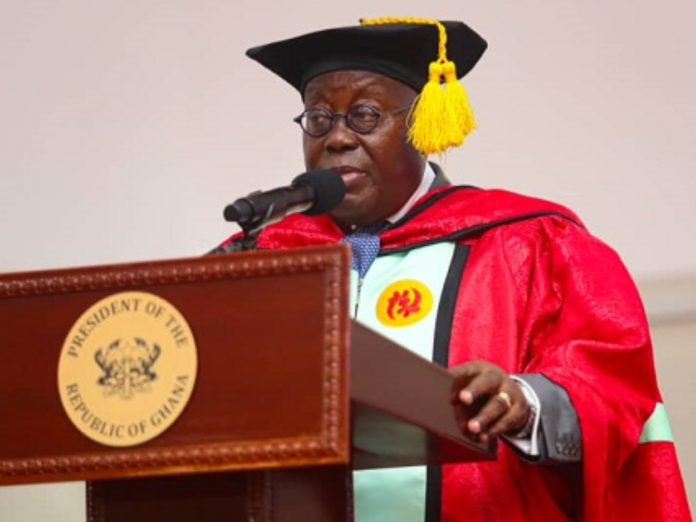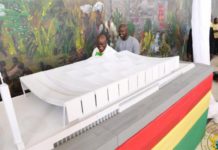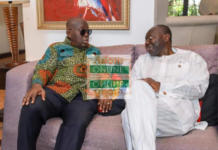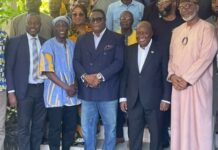
President Nana Addo Dankwa Akufo-Addo has said he will not do anything to gag the press nor preside over a culture of silence.
He noted that as a human rights lawyer who had spent a greater part of his adulthood promoting and protecting the freedoms and rights of his country and individuals, it would be ironic that his person or his government would promote a culture of silence.
The President said he had been a critical and integral part of promoting for the country a constitution that upheld the freedom of association, speech and the media, the separation of powers, the rule of law, a strong and vibrant environment and a private sector that made people prosper and would do nothing to jeopardise the gains made in that direction.
He was speaking at a special congregation at the University of Cape Coast (UCC) last Saturday.
The occasion was to award him an honorary Doctor of Philosophy degree for his meritorious contribution to educational development in the country, with particular reference to the implementation of the free Senior High School policy.
The freedom journey
Recalling how far Ghana had come in promoting press freedom, he said: “We did not wake up suddenly one morning, one day to find ourselves with over 400 different radio stations and dozens of television channels, instead of one radio station and one television station, both owned by the state. We went through many battles together to get to where we are today in the media sphere in our country.
“The Criminal Libel Law, which had been part of the legal architecture for decades, did not just suddenly disappear from our laws,” President Akufo-Addo said.
“I believe it is part of my make, and that when it comes to freedom of the press, I am certain I have nothing to apologise for with reference to anything I have ever done or said,” he stated.
President Akufo-Addo insisted that Ghanaians must understand that in him they had a President who is a respecter of human rights.
Political tradition
“With pride, I belong to the Danquah-Busia-Dombo political tradition, whose forebears, with great personal sacrifice, fought for the democratic open free system of governance the country is enjoying today and which has stood the test of time,” he said, explaining that those were the values and principles he stood for and would continue to uphold.
He said the New Patriotic Party (NPP) viewed civil liberties and human rights as conducive for economic growth and believed in supporting the individual to use his entrepreneurial prowess for legitimate living.
Press
President Akufo-Addo said he would prefer a reckless press to a dormant one.
“I appreciate well-argued opinions that challenge the status quo. I need no lessons on the importance of a vigorous media in building a healthy democracy. I dare say that the atmosphere in our country is one of spirited conversation and debate among politicians, the business community, civil society organisations and ordinary citizens,” he stated.

Not all journalists are upright
President Akufo-Addo noted that over the years many journalists had sought to soil his reputation.
He said many other people had suffered in the hands of such reckless journalists who went to great lengths to destroy people’s reputation.
MORE:
“Not all journalists are upright citizens, just as politicians, painters and farmers are not all upright citizens,” he stated.
The President said he expected the institutions concerned to deal fairly, firmly and equitably with all citizens according to the dictates of the law.
He said it was disturbing that a defence in response to a criticism of a government policy should be deemed an attack on press freedom.
“It cannot be that everyone has a right to a reply, except members of the government and officialdom. Nor can it be that challenging the opinions expressed by a journalist constitutes an attack on press freedom,” he stated.
Background
Some statesmen have expressed worry over what they have described as culture of silence and encouraged the citizenry to speak up on national issues on which they had reservations.
The Chancellor of the UCC, Sir Sam Jonah, recently bemoaned what appeared to be a culture of silence in the country.
After listing a litany of issues, he said: “What is baffling is that those who used to have voices on these things seem to have lost their voices. People speak on issues based on who is in power. Is our deafening silence suggesting that we are no longer concerned about issues that we complained about not too long ago, particularly when those issues persist?”
An economist and former presidental aspirant of the NPP, Mr Kwami Pianim, has also called for a conducive environment that allows citizens to express their feelings on issues affecting them, without fear of intimidation.
He told the Daily Graphic in an interview that freedom of expression in all forms was pertinent to a successful democracy, and that Ghana’s decision to chart that path meant that state organs must strive to promote its existence, instead of stifling it.
The Chief Executive Officer of the Ghana Chamber of Telecommunications, Mr Kenneth Ashigbey, at the closing of the Accountants Week last week, also called on professionals to make their voices heard.
Listening
The President said as a people, we needed to listen to one another more, as knowledge had never been a gift granted exclusively to one group, adding that he found it ironic that the Presidency of a man considered the most vilified political figure of his generation was accused of presiding over a culture of silence.
He said the decision of Twitter to cite its Africa headquarters in Ghana was because Ghana was a supporter of free speech, as was the decision by the Federation of African Journalists to hold its conference in Ghana this year.
Ahmed Suale
President Akufo-Addo reiterated the fact that the government did not have any interest in covering Ahmed Suale’s killers, saying in the end his murderers would be caught, tried and punished.
Strengthening institutions
The President said since his tenure begun, he had committed to strengthening institutions such as the National Commission for Civic Education, the Commission on Human Rights and Administrative Justice and similar ones to promote the protection of our freedoms.
He said budgetary allocations to the Judiciary, the police and other such institutions had significantly been increased to boost their capacities.
Police support
He said the government’s support for homeland security had increased by resourcing the Police Service to deliver on its mandate.
He said the government had increased the fleet of the service from 492 to 735, with additional vehicles, including 15 operational buses, to enhance police mobility.
President Akufo-Addo said 320 housing units were being constructed for the police, while communication was being enhanced to ensure effective policing and improvement in security.
He said an aero unit had been established for the police and six pilots trained for the unit.
The President gave an assurance that the government would do all it could to ensure that Ghanaians had the Police Service they deserved.
Watch the video below:






![CRC engages Akufo-Addo, Bawumia and Kyei Mensah-Bonsu [Photos]](https://www.adomonline.com/wp-content/uploads/2025/06/Constitutional-Review-Committee-218x150.jpg)